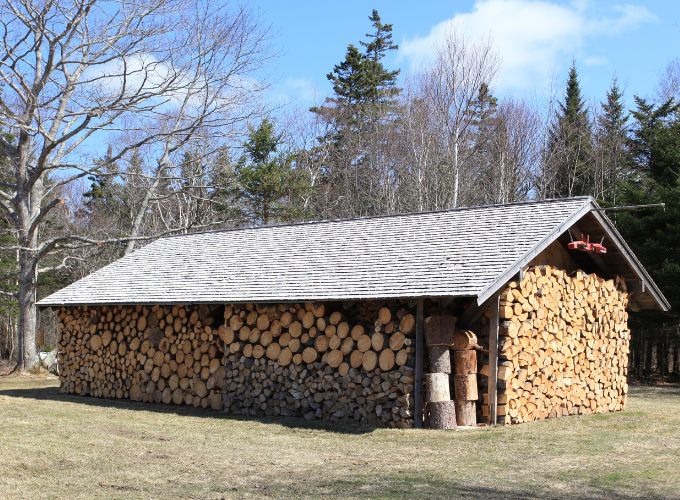
Self-Sufficiency: Maintain and Store Firewood with Ease
Whether you use firewood for heating or ambiance, proper maintenance and storage are essential for optimal performance and safety. In this guide, we’ll delve into the steps to maintain and store firewood yourself, ensuring a steady and reliable supply for your needs.
Choosing the Right Firewood
The first step in the process is choosing the right type of firewood. Hardwoods like oak, maple, and hickory are ideal choices as they burn longer and produce more heat. Softwoods like pine and spruce can be used but burn more quickly. Selecting well-seasoned wood with low moisture content minimizes smoke and ensures efficient burning.
Cutting and Splitting Techniques
If you’re sourcing your firewood from logs, proper cutting and splitting techniques are crucial. Invest in a quality chainsaw and splitting maul. Cut logs into manageable lengths, typically around 16 to 18 inches, and split them into pieces that facilitate optimal airflow and combustion.
Seasoning Firewood for Efficiency
Freshly cut wood contains a high moisture content, making it difficult to burn efficiently. Seasoning, or drying, is a crucial step. Stack the split wood in a dry, well-ventilated area for at least six months to a year. Cover the top of the stack to protect it from rain while allowing the sides to remain open for air circulation.
Creating an Adequate Storage Space
Proper storage is key to maintaining seasoned firewood. Choose a location that is dry, elevated, and well-ventilated. Construct a firewood rack or use pallets to keep the wood off the ground, preventing moisture absorption. Ensure that the storage area is easily accessible, especially during inclement weather.
Protecting Firewood from the Elements
While firewood needs exposure to air for seasoning, it should be protected from excessive moisture. Use a waterproof cover or tarp to shield the top of the woodpile from rain or snow. Leave the sides open to allow air circulation, preventing the growth of mold and mildew.
Rotating and Using the Oldest Wood First
Adopt a “first in, first out” approach to using firewood. Rotate your stockpile, utilizing the oldest wood first. This ensures that the wood remains well-seasoned and doesn’t become overly dry, leading to faster burning and reduced heat output.
Inspecting for Pests and Insects
Regularly inspect your firewood for signs of pests and insects. Termites, ants, and beetles can infest stored wood, potentially spreading to your home. If you notice any issues, promptly remove the affected wood and consider treating the storage area to prevent further infestation.
Maintaining a Clean and Organized Storage Area
A clean and organized storage area not only enhances the aesthetics but also contributes to firewood longevity. Remove debris and fallen leaves regularly to prevent a buildup that can trap moisture. Keep the storage area well-organized to easily access different wood types and ages.
Safety Measures for Firewood Storage
Safety is paramount when maintaining and storing firewood. Keep the storage area a safe distance from your home to minimize the risk of fire spreading. Stack the woodpile securely to prevent collapsing, especially if it’s a considerable height. Adhere to local fire safety guidelines and regulations.
Utilizing Firewood Ash as Fertilizer
As you use firewood, collect the ash for an eco-friendly benefit. Wood ash contains potassium and calcium carbonate, making it an excellent fertilizer for gardens. Spread a thin layer of wood ash around plants to enhance soil quality and promote healthy growth.
Conclusion: Self-Sufficient Firewood Management
Maintaining and storing firewood yourself is a rewarding endeavor that ensures a consistent and efficient supply for your heating or recreational needs. By following these steps, you not only create a self-sufficient system but also contribute to a more sustainable and eco-friendly lifestyle.
For more detailed guidance on maintaining and storing firewood yourself, visit mimimises.org for expert tips and additional resources.
